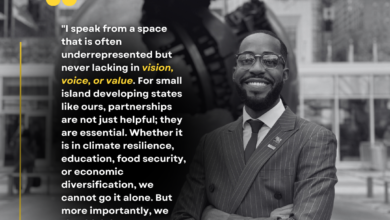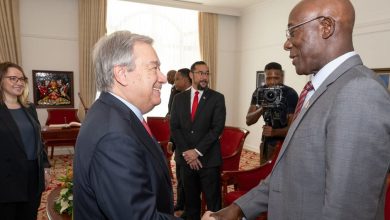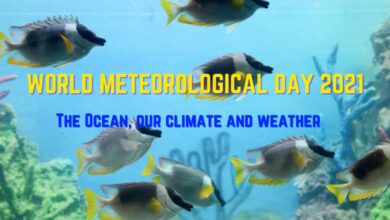The Climate Adaptation Summit (CAS) 2021, a global conference held on 25-26 January 2021, brought together a range of participants to highlight adaptation efforts needed to respond to the effects of a changing climate.
In the opening session, UN Secretary General Antonio Guterres called
for “a breakthrough on adaptation and resilience”.
The Coordinating Director of the Caribbean Meteorological Organization (CMO) Headquarters, Dr Arlene Laing, was invited to participate in the anchor event on disaster risk management, “Getting ahead of the climate curve: Investing in early warning and early action”, hosted by the Risk-informed Early Action Partnership (REAP), the World Meteorological Organization (WMO) through the Climate Risk and Early Warning Systems (CREWS) initiative and the International Federation of Red Cross and Red Crescent Societies (IFRC). Early warning systems are an effective means of building resilience to extreme weather and adapting to climate change.

The session highlighted investments needed to ensure people-centred early warning and early action, especially for vulnerable populations in Africa, low-income countries and small island developing states, such as the Caribbean islands.
The CMO Coordinating Director spoke of the contributions of Caribbean National Meteorological and Hydrological Services to early warning of extreme weather and climate hazards and the regional collaborations, such as support from the Caribbean Institute for Meteorology and Hydrology (CIMH), the technical organ of the CMO, and Caribbean Disaster and Emergency Agency (CDEMA), and other partners through the Caribbean Community (CARICOM) that support early warning and early action. She described the challenges faced by the National Meteorological Services, such as inadequate human and technical resources and the need for recognition of their value to economic development. Also noted was the need for access to data and partnerships for effective impacts-based forecasting, which focuses on “what the weather will do” in order to solicit appropriate action to save lives, livelihoods, and property. She thanked the CREWS initiative, which is being implemented by the WMO and the World Bank, for helping to strengthen the national hydro-meteorological services in the Caribbean.
The WMO Secretary General, Prof. Petteri Taalas noted that severe gaps in the observing system, especially in Africa, Caribbean, Pacific Islands, and in some parts of Latin America, were affecting the quality of early warning services and negatively impacting weather forecasts globally. To alleviate
that problem, the WMO is creating a financing mechanism, the Systematic Observations Financing Facility (SOFF)” with more than 30 organizations, to ensure sustainable observations in the most vulnerable countries and skilful weather and climate prediction as a public good for all nations.
The World Bank Vice President for Sustainable Development, Dr Juergen Voegele underscored the Bank’s support for SOFF and stressed the value of weather, climate, and water services to climate adaptation and sustainable development.
Further information about the session may be found at – CAS 2021 Anchoring Event – Getting Ahead of the Climate Curve: Investing in Early Warning – Early Action (Disaster Risk Management) | CAS 2021 at a glance | Climate Adaptation Summit 2021 and a recording is available at: – VIDEO
-END-
Contact:
Dr Arlene Laing
Coordinating Director
CMO Headquarters Unit
cmohq@cmo.org.tt
About the CMO
The Caribbean Meteorological Organization (CMO) is a specialized agency of the Caribbean Community (CARICOM) that coordinates the joint scientific and technical activities in weather, climate and water – related sciences in Anguilla, Antigua and Barbuda, Barbados, Belize, British Virgin Islands, Cayman Islands, Dominica, Grenada, Guyana, Jamaica, Montserrat, St. Kitts and Nevis, Saint Lucia, St. Vincent and the Grenadines, Trinidad and Tobago, and Turks and Caicos Islands.
The Organs of the CMO are the: (i) Caribbean Meteorological Council (CMC)-Governing Body of the CMO, (ii) Headquarters Unit, headed by a Coordinating Director, located in Trinidad and Tobago; (iii)
Caribbean Institute for Meteorology and Hydrology (CIMH) located in Barbados; and (iv) Caribbean Meteorological Foundation (CMF). The CMO originated from the British Caribbean Meteorological Service, founded in 1951. Federalization produced the West Indies Meteorological Service (WIMS), which became the Caribbean Meteorological Service (CMS) in 1962. In 1967, the CMS created the Caribbean Meteorology Institute (later the Caribbean Institute for Meteorology and Hydrology, CIMH),
the technical Organ of the CMO. With the establishment of many National Meteorological Services after independence, the Caribbean Meteorological Service was transformed into the CMO in 1973, so that the joint activities could continue (http://www.cmo.org.tt/history.html).






